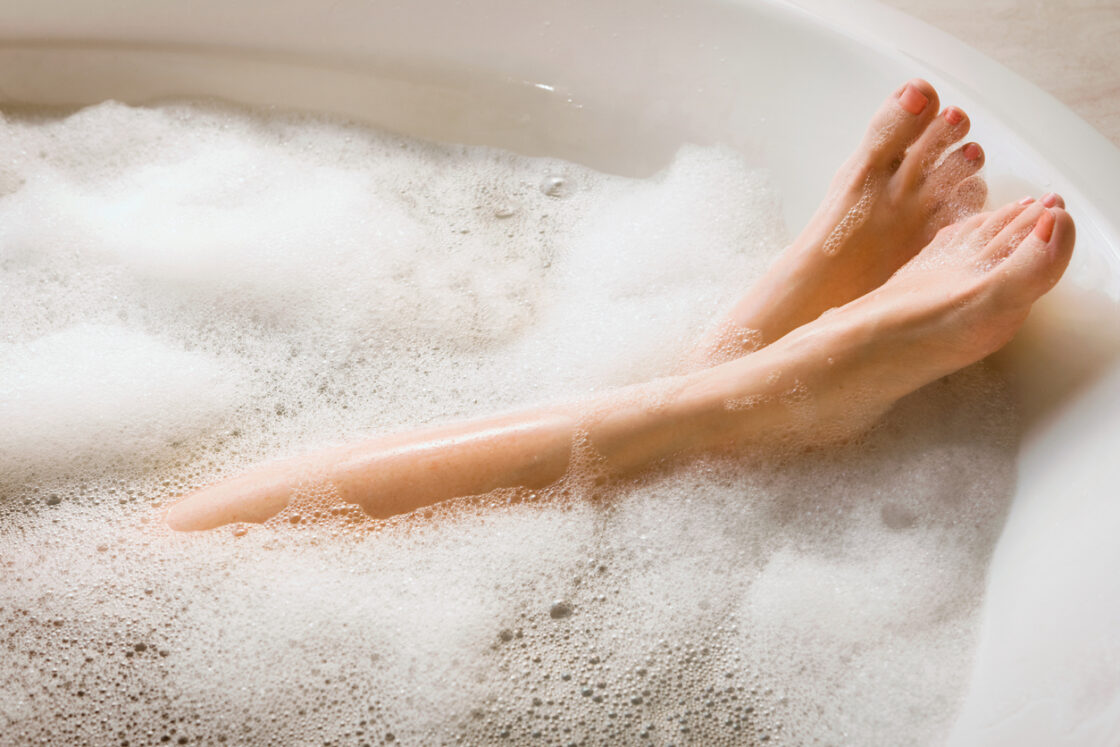Get the Best Night’s Sleep Ever: Establish a Nighttime Routine
Good night.

Prioritizing shut eye, getting some hygge on, detoxing your bedroom, and using natural remedies to have the best sleep ever are not only important – they’re trending.
Still having a hard time hitting the sheets and falling asleep? Here’s how to create your own rejuvenating and serene nighttime routine and have the best sleep ever.

1. Fork (or Spoon) Down
Step one to the best sleep ever is to put down the ice cream pint. It may be tempting to nosh on salty snacks and desserts up until crawling into bed, but try to eat dinner (or dessert) at least one hour before turning in for the night.
A 2005 study published in the American Journal of Gastroenterology studying the late-night snacking habits of 350 individuals found that those who ate a large meal within three hours of bedtime were more likely to develop symptoms of acid reflux disease. This includes heartburn, bloating, nausea, abdominal pain, and general discomfort.
I recommend eating a moderately sized dinner (eat breakfast like a king, lunch like a prince, and dinner like a pauper) filled with healthy fats, protein, and carbohydrates at least two to three hours before bed. This allows the digestive system to focus on extracting nutrients and getting the most from your food. Going to bed bloated and intensely stuffed can also interfere with sleep patterns.
Ate dinner hours ago and still hungry before bed? Have a simple snack of an organic apple with nut butter, a hard-boiled egg, half an avocado, or a handful of nuts. These healthy-fat and protein filled snacks will hold you over until breakfast.

2. Unplug Before Bed
To get the best sleep ever: unplug from everything. Turn off all screens (yes, even Netflix and Instagram) within at least one to two hours before bedtime. All screens emit blue light, which has been shown to suppress the sleep hormone melatonin, and interfere with our body’s natural sleep mechanisms.
A 2014 study from Brigham and Women’s Hospital found that those who read an iPad before sleep, as opposed to those who read an actual book, “took longer to fall asleep and had reduced evening sleepiness, reduced melatonin secretion, later timing of their circadian clock and reduced next-morning alertness,” according to Anne-Marie Chang, PhD, corresponding author, and associate neuroscientist in BWH’s Division of Sleep and Circadian Disorders.
Even more, the study found that those who used screens prior to bed spent less time in REM sleep, the restorative part of the sleep cycle, and had delayed circadian rhythm. Participants who used screens were also sleepier and less alert the following morning – even after eight hours of sleep.
Turn off the screen and pick up a book instead. If reading before bed isn’t your thing, indulge in some of our favorite self care rituals (below) instead.

3. Indulge In PM Self Care Rituals
Now that you know Netflix is off the table pre-bedtime (sorry!), it’s time to create a different kind of nightly ritual. Instead of crashing on the couch, take a warm bubble bath filled with relaxing essential oils like lavender or eucalyptus. Add in Epsom salts to boost circulation, calm tired and sore muscles, and reduce the stress of the day. No tub in the bathroom? Taking a hot shower is just as relaxing and therapeutic.
Other ways to practice self-care in the evening include DIY facials, baking or batch-cooking for the week or following day, legs up the wall yoga pose, giving yourself a facial massage, reading a book, stretching, doing gentle yoga, foam rolling, or going for an evening walk (with or without a dog).
Making a warm cup of tea is one of my favorite ways to unwind from the day. Choose a caffeine-free herbal blend or make a mug of a magnesium supplement evening drink.

4. Establish A Sleep Sanctuary
The easiest way to get the best sleep ever is to make your bed a place you love. This starts with the mattress, pillows, and sheets that make the bed.
When is the last time you purchased new pillows?
Pillows should be replaced every two years, as they often work like sponges to absorb face and hair oils, dust mites, and odor causing bacteria. Use a pillow cover protector to extend the life of your pillow and wash it every month.
Mattresses, according to the National Sleep Foundation, can last nine to ten years – if they are of high quality.
If the mattress was inexpensive and unsupportive to begin with, replace every five years.
Like pillows, mattresses collect body oils, dust mites, and bacteria (gross), and are laden with polyurethane foam, toxic flame-retardants, and stain-resistant chemicals. Look for organic mattresses, which are made with organic cotton and without synthetic latex, chemicals, and toxic materials.
Crawling into clean sheets is one of the best feelings in the world.
Look for sheets, made with organic cotton, and wash at least once a week to remove odors, sweat, dust, and bacteria.
Turn your bedroom into a sleep sanctuary by making it a serene, calm, and cool (literally) place.
Dr. Christopher Winter, Medical Director at Charlottesville Neurology and Sleep Medicine, says the bedroom temperature should be between 60 to 67 degrees Fahrenheit for optimal, restorative sleep.
Keep it Minimal
Remove the television from the bedroom along with any other clutter (boxes, exercise equipment, messy bookcases) to make a minimalistic sleep space.
Purify and Freshen Your Bedroom
Light natural beeswax or nontoxic candles, add green and air-purifying house plants, and place an essential oil diffuser in the space for an even dreamier bedroom.
See you in the morning.
Related On Organic Authority
9 Trusted CBD Brands That Source Organic Hemp & Provide Third Party Testing
13 Adaptogens to Help You Conquer Stress
3 Ways to Get a Good Night’s Sleep (and the Life-Changing Benefits)

